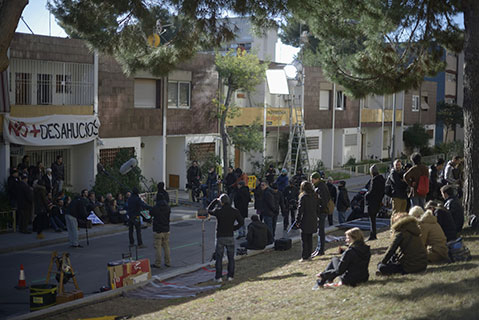At Your Doorstep
Director Eduard Cortés

The United States was not alone in it’s suffering at the hands of 2007 housing market crisis and subsequent financial crash. By the tens of thousands, people all over the world were devastated by the bursting of a greed-driven bubble. At Your Doorstep (Cerca de Tu Casa) intertwines the stories of a handful of individuals trying to find their way through the crisis in Spain in a musical that both inspires and demoralizes. See cercadetucasa.org.
Given the subject matter, the musical nature of At Your Door Step might surprise people. Explain your thinking behind making the film a Brechtian musical?
In recent years, the media in this country have bombarded us with hundreds of news stories, financial figures, reports, and interviews about the drama of evictions. From the beginning I was certain our film needed to bring a new look. I wanted to distance myself from what I sensed was already saturating people. For that reason I decided to approach the subject with a more emotional and more poetic look that was able to move the viewer from the heart. The songs offered me a very powerful emotional engine and the fact of making a musical on such a hard subject also gave the film a singularity that seemed very attractive to me.
Many of the characters seem to suffer from shame related to the financial crisis. Why do you think people felt so ashamed about something that wasn’t entirely their fault?
The idea of failure, unfortunately, stigmatizes a lot. People do not want to be singled out as individuals unable to manage their lives successfully. In 2007, when the crisis began, many people lost everything: work, home, family, dignity.
At that time, the media had not yet amplified what was happening and many of those people lived their drama with guilt. They believed that it was they who had failed, those who had not been able to keep the job, to secure a roof for their families. Many of them were unwilling to bear this stigma before relatives or neighbors and lived the whole process in a truly terrible solitude and isolation.
It was not until a few years later, when the number of evictions was so obvious, that the system could only be blamed. It was only then that people could change their attitude in a radical way. They restored dignity, and with it, the capacity for struggle, solidarity and, above all, empathy.
Do you think we have learned our lessons from the housing/financial crisis or are we doomed to repeat it?
Unfortunately, it is going to happen again once and a hundred times more. The system works like this.The bubble does not break completely. It swells and deflates. Swinging and cruel, it will not stop easily.



